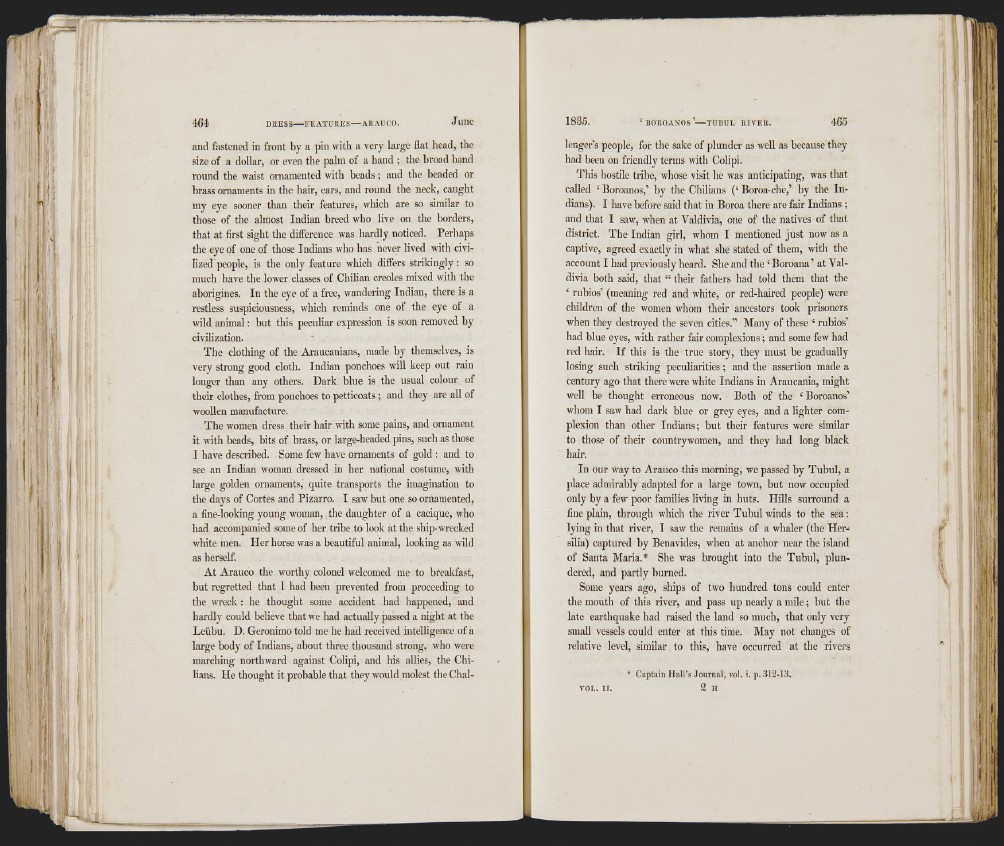
464. DRESS FEATURES ARAUCO. J line
. I l l
and fastened in front by a pin with a very large flat head, the
size of a dollar, or even the palm of a hand ; the broad hand
round the waist ornamented with beads ; and the beaded or
brass ornaments in the hair, ears, and round the neck, caught
my eye sooner than their features, which are so similar to
those of the almost Indian breed who live on the borders,
that at first sight the difference was hardly noticed. Perhaps
the eye of one of those Indians who has never lived with civilized
people, is the only feature which differs strikingly : so
much have the lower classes of Chilian creoles mixed with the
aborigines. In the eye of a free, wandering Indian, there is a
restless suspiciousness, which reminds one of the eye of a
wild animal: but this peculiar expression is soon removed by
civilization.
The clothing of the Araucanians, made by themselves, is
very strong good cloth. Indian ponchoes will keep out rain
longer than any others. Dark blue is the usual colour of
their clothes, from ponchoes to petticoats; and they are all of
woollen manufacture.
The women dress their hair with some pains, and ornament
it with beads, bits of brass, or large-headed pins, such as those
I have described. Some few have ornaments of gold : and to
see an Indian woman dressed in her national costume, with
large golden ornaments, quite transports the imagination to
the days of Cortes and Pizarro. I saw but one so ornamented,
a fine-looking young woman, the daughter of a cacique, who
had accompanied some of her tribe to look at the ship-wrecked
white men. Her horse was a beautiful animal, looking as wild
as herself.
At Arauco the worthy colonel welcomed me to breakfast,
but regretted that I had been prevented from proceeding to
the wreck : he thought some accident had happened, and
hardly could believe that we had actually passed a night at the
Leiibu. D. Geronimo told me he had received intelligence of a
large body of Indians, ahout three thousand strong, who were
marching northward against Colipi, and his allies, the Chilians.
He thought it probable that they would molest the Chal1835.
‘ b o r o a n o s ’ TUBUI. RIVER. 465
lenger’s people, for the sake of plunder as well as because they
had been on friendly terms with Colipi.
This hostile tribe, whose visit he was anticipating, was that
called ‘ Boroanos,’ by the Chilians (‘ Boroa-che,’ by the Indians).
I have before said that in Boroa there are fair Indians ;
and that I saw, when at Valdivia, one of the natives of that
district. The Indian girl, whom I mentioned just now as a
captive, agreed exactly in what she stated of them, with the
account I had previously heard. She and the ‘ Boroana ’ at Valdivia
both said, that “ their fathers had told them that the
‘ rubios’ (meaning red and white, or red-haired people) were
children of the women whom their ancestors took prisoners
when they destroyed the seven cities.” Many of these ‘ rubios’
had blue eyes, with rather fair complexions; and some few had
red hair. If this is the true story, they must be gradually
losing such striking peculiarities; and the assertion made a
century ago that there were white Indians in Araucania, might
well be thought erroneous now. Both of the ‘ Boroanos’
whom I saw had dark blue or grey eyes, and a lighter complexion
than other Indians; but their features were similar
to those of their countrywomen, and they had long black
hair.
In our way to Arauco this morning, we passed by Tubul, a
place admirably adapted for a large town, but now occupied
only by a few poor families living in huts. Hills surround a
fine plain, through which the river Tuhul winds to the sea:
lying in that river, I saw the remains of a whaler (the Her»
silia) captured by Benavides, when at anchor near the island
of Santa Maria.* She was brought into the Tubul, plundered,
and partly burned.
Some years ago, ships of two hundred tons could enter
tlie mouth of this river, and pass up nearly a mile; but the
late earthquake had raised the land so much, that only very
small vessels could enter at this time. May not changes of
relative level, similar to this, have occurred at the rivers
* Captain Hall’s Journal, vol. i. p. 312-13.
v o l.. II . 2 H
l!
■11 ; I ' ]
i ''
If'
\ ■
1 fi
-li